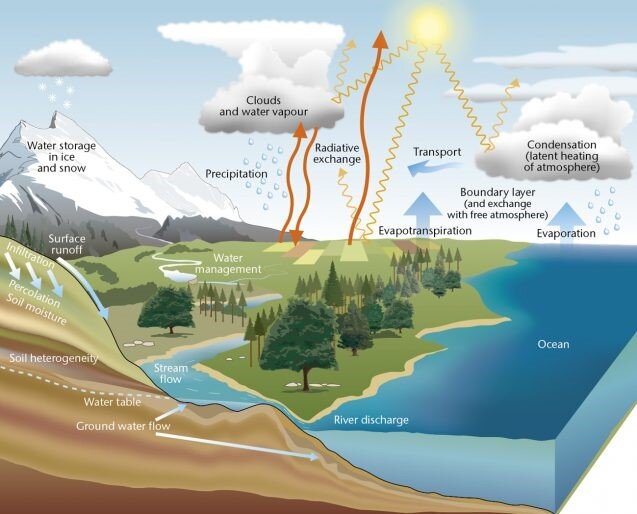Hello and welcome back!
It’s been a while, but that’s because we’ve been working away to develop and scale our really exciting WiseH2O™ app!
Before we share more with you on our recent activities (stay tuned for our next post), we wanted to write this blog post to let you know about some of the important research going on around climate change and water. Currently, scientific research is playing a critical role in helping us- citizens, researchers, legislators, etc- understand the cause and effect of climate change on water quality and availability. One exciting document that has come out recently is from the Earth Institute at Columbia University (linked here or at the end of the document).
Published by Sarah Fecht, the report features easy-to-process visuals alongside relevant information to create an accessible report of the members of the Institute’s recent findings:
“Consider a water cycle diagram, like the one below; global warming is altering nearly every stage in the diagram. These changes will put pressure on drinking water supplies, food production, property values, and more, in the U.S. and all around the world.” (Fecht)
Image Credit UK Met Office
Fecht further breaks down the water cycle into it’s components to systematically explain the implications of climate change on each component. Additionally, Fecht eloquently establishes a basis of the scientific subjects of her research for her audience: “Heavier rainstorms will also increase surface runoff — the water that flows over the ground after a storm. This moving water may strip nutrients from the soil and pick up pollutants, dirt, and other undesirables, flushing them into nearby bodies of water. Those contaminants may muck up our water supplies and make it more expensive to clean the water to drinking standards. The National Climate Assessment finds that water quality is already diminishing in many parts of the U.S, “particularly due to increasing sediment and contaminant concentrations after heavy downpours.” (Fecht)
Not only does this report indicate the importance of scientific research, it indicates progress in the field of climate change science. Furthermore, by first stating the evidence, to then explain potential implications, Fecht compiles information in such a way that maintains professionalism while ensuring greater access to the information. Rather than relying on an audience with high acuity specific to the field, Fecht invites anyone and everyone to engage in the dialogue over water quality and climate change.
As a company with the mission to provide people with access to information so that they know what’s in their water (healthy waterways for all), seeing documents like this is incredibly exciting. We began this project with a belief in the power of citizen science to enable people’s understanding of the environment around them. Knowledge is power, and we want to empower others with the knowledge of what’s in their water. Thus, as more reports emerge confirming the significant and detrimental effects of climate change, we become more resolute in our mission, and we hope you will too.
So, here’s our ask of you: go out, find sources like Fecht, inform yourself, and begin informing your community- big or small. WiseH2O™ is our way of informing local communities in the context of a global scale. By no means do you have to go that large in scale, but one more informed citizen is still one more informed citizen!
Please reach out if you have any questions, reactions, or resources you love. Until next time!
Cheers,
The MobileH2O Team

